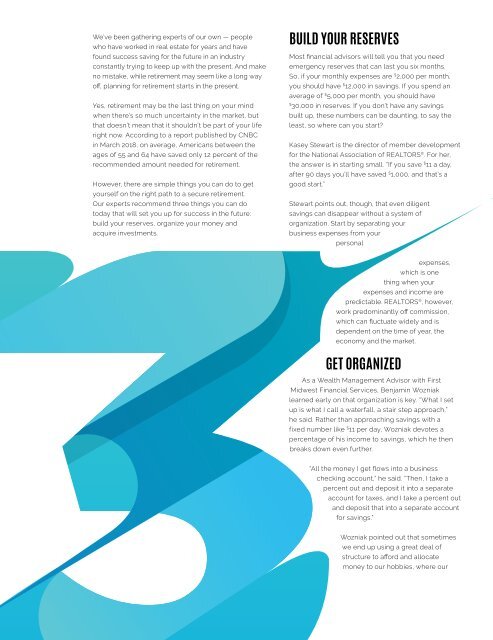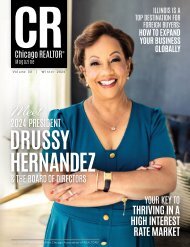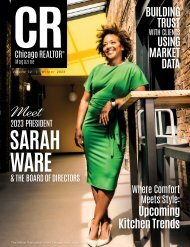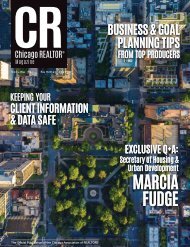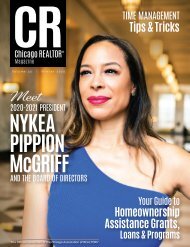CR_Summer2020_Online
The official publication of the Chicago Association of REALTORS®.
The official publication of the Chicago Association of REALTORS®.
Create successful ePaper yourself
Turn your PDF publications into a flip-book with our unique Google optimized e-Paper software.
We’ve been gathering experts of our own — people<br />
who have worked in real estate for years and have<br />
found success saving for the future in an industry<br />
constantly trying to keep up with the present. And make<br />
no mistake, while retirement may seem like a long way<br />
off, planning for retirement starts in the present.<br />
Yes, retirement may be the last thing on your mind<br />
when there’s so much uncertainty in the market, but<br />
that doesn’t mean that it shouldn’t be part of your life<br />
right now. According to a report published by CNBC<br />
in March 2018, on average, Americans between the<br />
ages of 55 and 64 have saved only 12 percent of the<br />
recommended amount needed for retirement.<br />
However, there are simple things you can do to get<br />
yourself on the right path to a secure retirement.<br />
Our experts recommend three things you can do<br />
today that will set you up for success in the future:<br />
build your reserves, organize your money and<br />
acquire investments.<br />
BUILD YOUR RESERVES<br />
Most financial advisors will tell you that you need<br />
emergency reserves that can last you six months.<br />
So, if your monthly expenses are $ 2,000 per month,<br />
you should have $ 12,000 in savings. If you spend an<br />
average of $ 5,000 per month, you should have<br />
$<br />
30,000 in reserves. If you don’t have any savings<br />
built up, these numbers can be daunting, to say the<br />
least, so where can you start?<br />
Kasey Stewart is the director of member development<br />
for the National Association of REALTORS ® . For her,<br />
the answer is in starting small. “If you save $ 11 a day,<br />
after 90 days you’ll have saved $ 1,000, and that’s a<br />
good start.”<br />
Stewart points out, though, that even diligent<br />
savings can disappear without a system of<br />
organization. Start by separating your<br />
business expenses from your<br />
personal<br />
expenses,<br />
which is one<br />
thing when your<br />
expenses and income are<br />
predictable. REALTORS ® , however,<br />
work predominantly off commission,<br />
which can fluctuate widely and is<br />
dependent on the time of year, the<br />
economy and the market.<br />
GET ORGANIZED<br />
As a Wealth Management Advisor with First<br />
Midwest Financial Services, Benjamin Wozniak<br />
learned early on that organization is key. “What I set<br />
up is what I call a waterfall, a stair step approach,”<br />
he said. Rather than approaching savings with a<br />
fixed number like $ 11 per day, Wozniak devotes a<br />
percentage of his income to savings, which he then<br />
breaks down even further.<br />
“All the money I get flows into a business<br />
checking account,” he said. “Then, I take a<br />
percent out and deposit it into a separate<br />
account for taxes, and I take a percent out<br />
and deposit that into a separate account<br />
for savings.”<br />
Wozniak pointed out that sometimes<br />
we end up using a great deal of<br />
structure to afford and allocate<br />
money to our hobbies, where our<br />
16 Chicago REALTOR ® Magazine


